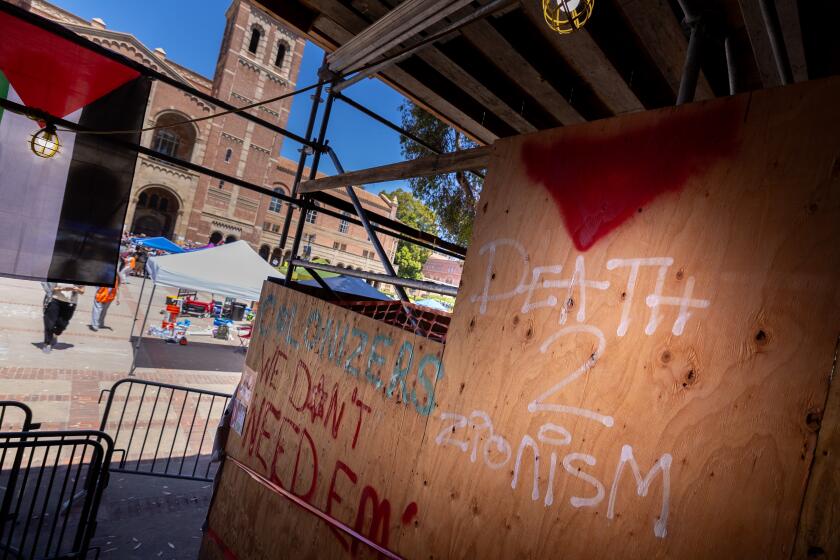Shultz Offer on Mideast: Take It or Leave It
Secretary of State George P. Shultz, arriving Thursday at the start of a new Middle East peace shuttle, said he will present an American plan to Israeli and Arab leaders on a take-it-or-leave-it basis.
Talking to reporters aboard his jetliner on a flight from Washington to Jerusalem, Shultz said that he is prepared to negotiate the details of the American proposal in Israel, Jordan, Egypt and Syria, but that he will not consider fundamental changes in it.
He made it clear that he will not play along if the parties adopt the familiar negotiating ploy of seizing on part of the proposal while rejecting the rest.
“There are various elements in this package,” Shultz said. “You shouldn’t think of it as kind of a cafeteria line. You have to look at it as an integrated piece.”
He added that the U.S. package “has an appropriate balance to it” that would be upset by major changes.
The ongoing violence in the Israeli-occupied territories--the West Bank of the Jordan River and Gaza Strip--claimed its 64th and 65th Palestinian victims as Shultz arrived. An 18-year-old youth from the Jenin refugee camp in the West Bank died from Israeli army gunfire, and another youth was killed in Nablus. At least eight others were wounded in episodes of violence, four of them in the Jenin incident, which the army said occurred when a patrol came under rock-throwing attack by angry Palestinians.
Strike Effective
There were scattered disturbances elsewhere in the West Bank, and a general commercial strike, called by the so-called Unified National Leadership for the Uprising in the Occupied Territories to coincide with Shultz’s arrival, was fully effective.
Although much of Shultz’s peace plan remains secret, American officials say that it calls for early negotiations among Israel, Arab states and representatives of the Palestinians over the future status of the West Bank and Gaza Strip. Israel has occupied the two areas since the Arab-Israeli war of 1967.
So far, elements on nearly every side of the complex situation have expressed skepticism about the American approach. U.S. officials admit that it will be difficult for Shultz to bridge the gap of mistrust.
Arab leaders have complained that Shultz’s purpose is to try to calm the 11-week-old Palestinian uprising in the occupied regions by misleading their residents into believing that improvements are on the way.
Can’t Go Back
Responding to such concerns, Shultz said the Jerusalem government must recognize that it cannot hope to return to the situation that prevailed before the uprising, a condition under which Israel maintained military control of the predominantly Arab territories.
“There is an underlying problem consisting of a large number of people in an occupied area that don’t have the basic rights of governance,” he said. He said the situation “is just inherently not a stable situation.”
Elaborating on the point in a statement as he arrived at Ben-Gurion Airport, Shultz said: “Recent events have underscored a clear and crucial fact: The status quo in the region is not a stable option for any of the parties. At the same time, the status quo must not be changed in a way that would endanger Israel’s security. Our objective is to help Israel and its neighbors achieve peace and security, and to help Palestinians achieve their legitimate rights.”
Departs From Reagan View
Shultz said the Palestine Liberation Organization and other groups have attempted to exploit the disturbances, but he refused to join President Reagan, who told a press conference Wednesday night that “outsiders” had instigated the unrest.
“As I have read the intelligence (reports), there are various opinions about the unrest,” Shultz said. “I think its fundamental origins are essentially indigenous.”
Although Shultz insists that he will not accept fundamental changes in his proposal, his aides say he is prepared to shuttle among Jerusalem, Amman, Cairo and Damascus for as long as there seems to be any chance of persuading Israeli and Arab leaders to approve the U.S. plan.
His schedule calls for him to fly to Brussels next Tuesday to join Reagan at the scheduled North Atlantic Treaty Organization summit meeting. But aides say that Shultz will return to the Middle East right after the summit if he believes progress is being made.
No Simple Matter
Although the most pressing problem is the future of the West Bank and Gaza Strip and their 1.4 million Palestinian residents, the equation is far more complicated than a simple Israeli-Palestinian conflict.
For one thing, the three top leaders of Israel’s coalition government--Prime Minister Yitzhak Shamir, Foreign Minister Shimon Peres, and Defense Minister Yitzhak Rabin--do not agree with each other on the approach to the talks.
Shamir, leader of the right-wing Likud Bloc, opposes any solution which would require Israel to yield sovereignty over any part of the West Bank or Gaza. Peres, leader of the centrist Labor Alignment, favors some sort of “territorial compromise,” although he balks at Arab demands for Israeli evacuation of all of the territory seized in 1967.
Disagree on Details
Although all of the Arab parties demand total Israeli withdrawal from the occupied territories, they disagree among themselves about most details of a settlement.
Earlier U.S. peace initiatives were intended to draw Israel and Jordan into bilateral talks similar to the Israel-Egypt negotiations at Camp David in 1978. But these efforts failed, in part because Syria was in a position to torpedo any agreement that it was not a party to.
“We recognize that Syria is an important state in the region,” Shultz said. However, the addition of the Damascus regime, probably Israel’s most implacable foe, makes the talks far more complex.
The Shultz shuttle has already run into one snag with the refusal of West Bank and Gaza Palestinians to meet with him during his stay here.
Front-Page Editorial
Anxious that the Palestinians not be blamed for any failure of Shultz’s mission, the pro-PLO Arabic language newspaper Al Fajr on Thursday published an extraordinary editorial in English on its front page, explaining the Palestinian position.
“Now that Shultz is coming to discuss the national rights of the Palestinian people, he should do so in the form of a meeting with a Palestinian delegation, comprised not only of a part of our people, but representing the entire spectrum, both those inside the occupied territories and those outside,” the editorial said.
“Such a delegation, in order to be credible, should be nominated by the leadership of the Palestinians--the PLO,” it added.
Compromise Unlikely
Shultz has reportedly rejected such a Palestinian demand, and although there is still some effort afoot to arrange a meeting with representative Palestinians, sources said Thursday night that compromise appears unlikely.
The Al Fajr editorial was written by editor Hanna Siniora, who was to have been a key participant in a meeting with Shultz.
“We do not refuse to meet with U.S. Secretary of State Shultz, nor with any concerned party for that matter, but we cannot negotiate peace with someone who does not recognize the basic right of our people to self-determination,” the editorial said.
“Of all the people in the world, the Palestinian people are those most anxious to achieve a political settlement, for we are the ones suffering most as a result of the current political impasse,” Al Fajr said.
More to Read
Start your day right
Sign up for Essential California for news, features and recommendations from the L.A. Times and beyond in your inbox six days a week.
You may occasionally receive promotional content from the Los Angeles Times.






